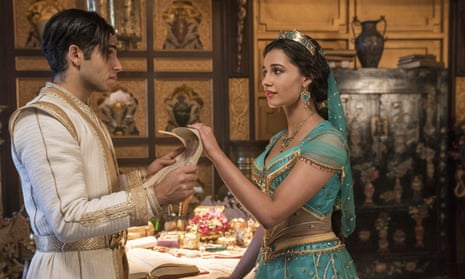“You look like Princess Jasmine” is a popular pickup line used on ethnic women with genetically natural tans and long, dark hair. It exoticizes us while making grasps at a comparison to one of the few brown women in mainstream media.
On 24 May, Princess Jasmine comes to life in the live-action revival of 1992’s Disney cartoon Aladdin, and news of the film has been met with excitement and anticipation – particularly from Middle Eastern and south Asian women who grew up with the film. Aladdin was a nod of approval from Disney to girls, including my younger self. It was as if Disney said brown was beautiful, too, just like the snow white princesses that had come before.
As an adult, I’m well aware I don’t need that validation, but for a younger generation, it’s a chance to finally see themselves represented on screen by a real person playing a character they have also probably been compared to their entire life.
R u even a brown girl if some white lady hasn’t said u look like princess Jasmine
— Daenerys is my queen now n always (@sahxra_) September 2, 2018
But casting Princess Jasmine is not without controversy. Naomi Scott, the British actor who plays the iconic royal, is of mixed English and Indian descent. And while she is no doubt talented, Scott’s “fair and lovely” casting ignited a larger conversation about the persistent issue of colorism in Hollywood. This iteration of Princess Jasmine ticks all the boxes of the Hollywood formula for casting a woman of color: a name that’s easy to pronounce and looks just white enough.
Why is it that, when casting the wife of a terrorist or extra number four in shows like Jack Ryan or Homeland, it seems easy enough to find a dark brown or Middle Eastern woman for the role, but when casting a Disney princess, directors and casting agents are stumped?
I’m so dissapointed with Disney choosing Naomi Scott to play princess Jasmine. Disney gon fuck around nd be like “fuck an actual Arab, just choose a brown girl that looks white”
— Dinho 🃏 (@imbigbroke) August 11, 2018
Other issues have been raised (mostly on angry Twitter) surrounding the casting of live-action Jasmine. Her country of origin, for example, has been frequently disputed. While some claim Jasmine is Arab because the movie opens with a song called Arabian Nights, others believe that the architecture in Agrabah is clearly based on the Taj Mahal, making Jasmine Indian. It’s a debate that has fueled speculation that in Hollywood, Indians and Arabs are interchangeable.
naomi scott is a half white, half indian actress playing princess jasmine, an arab character. do casting directors put a bunch of brown actors in a hat and pick one at random or do they seriously not know the difference between arabs and indians? pic.twitter.com/BOcUbaZwgA
— sara (@kamalasreactor) December 19, 2018
But perhaps all of these arguments are moot because Agrabah is a fictional country, created by a team of white writers and producers in the 90s. It is an amalgamation of all things remotely “exotic” from the sandiest parts of the world, including but not limited to: magic carpets, tigers, sultans, genies and apparently, the oppression of women. The costume design in the film is also confusing, combining kaftans with shalwars, and what can only be described as Party City’s take on a medieval harem girl.
All hope is not lost for Hollywood’s mission to get woke, but unfortunately the job of educating production companies on such issues falls to the actors themselves. Actor Amandla Stenberg, who is biracial and light-skinned, turned down a role in Black Panther, saying “there are spaces I should not take up” in an interview with Vanity Fair.
The point Hollywood still misses is that it should not be difficult to accurately cast people of color in main roles. But perhaps we should pick our battles. It’s amazing enough that Scarlett Johansson wasn’t cast as Jasmine or Jake Gyllenhaal as Aladdin. So we’ve made some progress, right?
